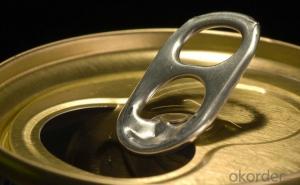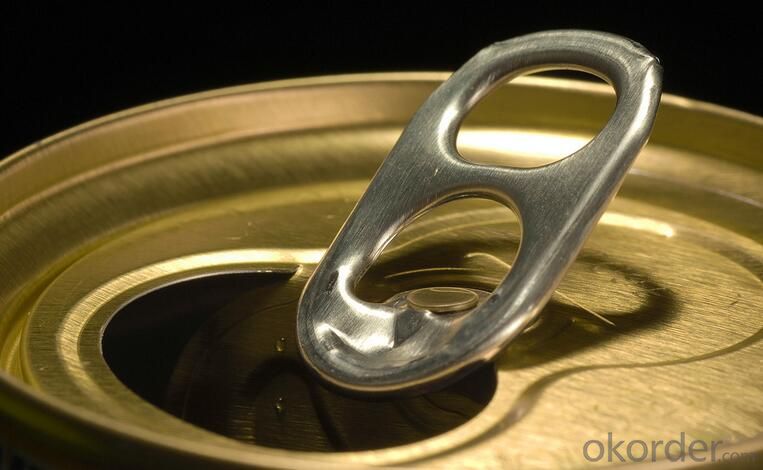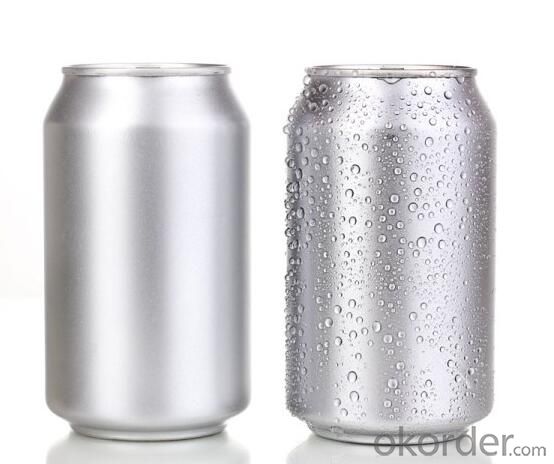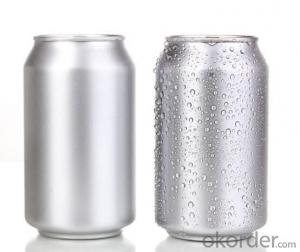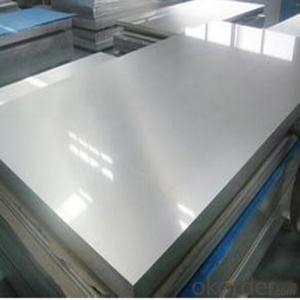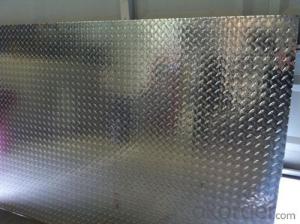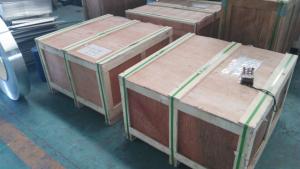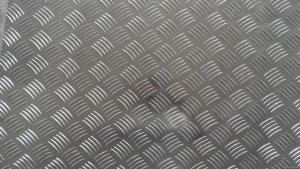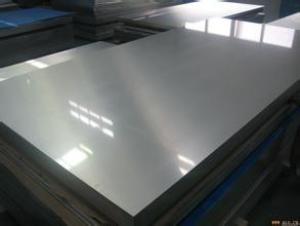Diamond Plate Aluminum Sheets 8000 Series Aluminum Can Stock with Can Pull Ring
- Loading Port:
- Shanghai
- Payment Terms:
- TT OR LC
- Min Order Qty:
- 3 m.t.
- Supply Capability:
- 500 m.t./month
OKorder Service Pledge
Quality Product, Order Online Tracking, Timely Delivery
OKorder Financial Service
Credit Rating, Credit Services, Credit Purchasing
You Might Also Like
Specification
Grade:
8011
Surface Treatment:
Mill Finish
Shape:
Round
Temper:
Half Hard
Application:
Food
Technique:
D/C, C/C
Thickness:
0.8--3
Width:
150-2000mm
Packaging:
Wooden pallet
Alloy:aa3104,aa5182,aa5052
Temper:h19,h48
Thickness:0.26-0.29mm
Width:700-1800mm( body stock),60-1800mm(end&tab stock)
Paint:ppg or valspar
Lubrication:henkel
Special specification is available on customer's requirement
Aluminu Can are dived to the can body and pull top, it can pack automatically with can filler to pack carbonated beverage like coloca, persi and hot filling juice for long shelf life. Now we have sizes as below:
Slick 330ml/310ml
270ml/200ml
Slim 250ml
Stubby 250ml
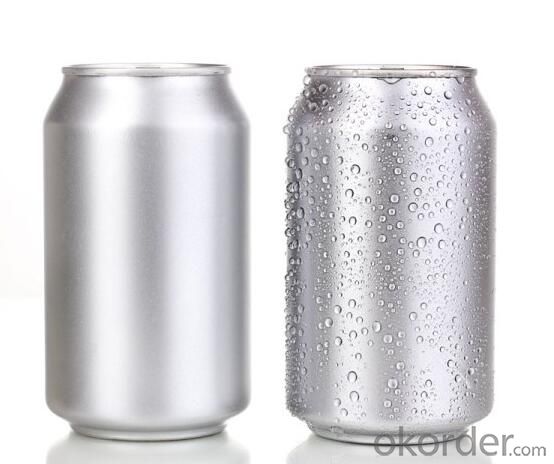
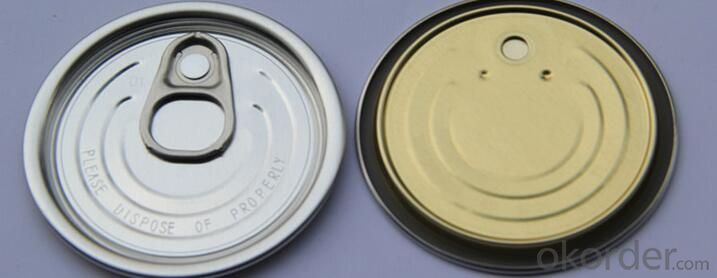
- Q: What is an aluminium plate? What is the difference between carbon steel sheet, galvanized sheet and stainless steel plate?What is the order of the price? Thank you
- Aluminized sheet, the full name of aluminum plating, also known as aluminized steel plate, also known as hot dipped aluminum plate.Aluminized steel plate is an aluminum silicon alloy coating steel plate, in which the aluminum content is 90%, silicon 10%. The aluminized steel plate has good heat resistance, heat reflection and corrosion resistance. Its mechanical and physical properties are better than those of cold-rolled steel sheet. Because of the superior performance of aluminized steel sheet, it has been widely used in our daily necessities. Such as car muffler, household appliances and so on.
- Q: Are aluminum sheets affected by UV radiation or sunlight exposure?
- Yes, aluminum sheets are affected by UV radiation and sunlight exposure. Over time, exposure to UV radiation and sunlight can cause the aluminum sheets to oxidize, resulting in a dull and discolored appearance. Additionally, prolonged exposure to UV rays can weaken the material, making it more prone to cracking or breaking. To protect aluminum sheets from the damaging effects of UV radiation, it is recommended to apply a protective coating or use anodized aluminum, which has a more robust and durable surface.
- Q: Are there any health risks associated with using aluminum sheets?
- The use of aluminum sheets has sparked ongoing debate and research due to potential health risks. Although aluminum is widely utilized in various industries and products, it is crucial to consider certain factors. Health issues have been linked to exposure to high levels of aluminum through inhalation or ingestion. Studies suggest that aluminum exposure may be connected to neurological disorders like Alzheimer's disease or Parkinson's disease, as well as respiratory problems and bone disorders. Nevertheless, it is important to note that these studies have not definitively established a causal relationship between aluminum and these health conditions. The primary concern with aluminum lies in its ability to leach into food or beverages when it comes into contact with acidic or salty substances. This leaching can happen during food preparation or storage, especially when using aluminum cookware or foil. Consuming excessive amounts of aluminum through food or drink may pose health risks, especially for individuals with kidney disease or those who are more susceptible to aluminum toxicity. To minimize potential health risks, it is recommended to avoid using aluminum cookware or foil when cooking or storing acidic or salty foods. Instead, consider utilizing alternatives such as stainless steel, glass, or silicone. In conclusion, while there are worries about the potential health risks associated with using aluminum sheets, further research is necessary to establish a clear cause-and-effect relationship. It is wise to reduce exposure to aluminum, particularly through food and beverages, by taking preventive measures and employing alternative materials when suitable. Seeking guidance from healthcare professionals and staying informed about the latest research can assist individuals in making informed decisions regarding the use of aluminum sheets and other aluminum products.
- Q: Can aluminum sheets be laminated?
- Indeed, it is possible to laminate aluminum sheets. Lamination involves the fusion of multiple layers to form a composite material that exhibits improved properties. Aluminum sheets, for instance, can undergo lamination with diverse substances like plastics, adhesives, or even alternative metals. This method has the potential to enhance the strength, durability, as well as the thermal and electrical conductivity of the aluminum sheets. The resultant laminated aluminum sheets find widespread application in numerous industries, including construction, automotive, aerospace, and packaging. This utilization is driven by the ability of the amalgamation of distinct materials to confer tailored characteristics suitable for specific purposes.
- Q: With a project I'm working on, I need to reinforce a small case made of aluminium. My options are to use regular old screws (probably steel) or Stainless Steel screws (much more costly). Just wondering what corrosion will be like? *It will never ever get wet,* so does that mean corrosion will not occur? (to a certain degree, obviously) And would corrosion, since its dry, still be affected by the type of metal used for the screws? The screws need to be strong, and they also need to be purchase-able at a regular hardware store, as I'm not going to go buying just screws on-line. Thanks for any info you can provide.
- Rivets would be best or enameled steel screws could be second choice.
- Q: What precautions should be taken while handling aluminum sheets to ensure safety?
- <p>When working with aluminum sheets, it's important to take certain safety measures. Always wear appropriate personal protective equipment (PPE) such as gloves, safety glasses, and a dust mask to protect against sharp edges and metal dust. Ensure good ventilation to avoid inhaling aluminum dust, which can be harmful. Use proper tools designed for metal work to prevent accidents. Keep the work area clean and free from clutter to minimize trip hazards. Be cautious of electrical hazards if using power tools, and ensure all tools are in good working order. Finally, be aware of the fire hazard potential of aluminum, especially when cutting or welding, and have fire extinguishers readily available.</p>
- Q: What are the fire-resistant properties of aluminum sheets?
- Aluminum sheets offer impressive fire-resistant qualities, making them an ideal choice for different applications that prioritize fire safety. The primary explanation for their fire resistance lies in the natural formation of a unique oxide layer on the aluminum's surface when exposed to oxygen. This layer acts as a protective barrier, preventing further oxidation and reducing the likelihood of combustion. Not only is the oxide layer on aluminum sheets highly stable, but it also boasts a high melting point. Consequently, it can endure high temperatures without melting or catching fire, rendering it flame-resistant. Additionally, the oxide layer acts as an effective thermal insulator, slowing down heat transfer and impeding the spread of fire. Another benefit of aluminum sheets is their low flammability. Aluminum is a non-combustible material, meaning it does not burn or support combustion. This characteristic proves especially advantageous in situations where fire containment and prevention are critical. Furthermore, aluminum sheets possess exceptional heat dissipation capabilities. They swiftly disperse heat away from the source, minimizing the risk of overheating and potential fire hazards. This makes them suitable for various heat-intensive applications, including electrical enclosures, automotive parts, and industrial machinery. In conclusion, aluminum sheets demonstrate remarkable fire-resistant qualities due to the protective oxide layer, non-combustible nature, and efficient heat dissipation. These attributes make them highly sought after for applications that prioritize fire safety, offering reassurance and safeguarding against potential fire incidents.
- Q: What is the cost of an aluminum sheet?
- The cost of an aluminum sheet can vary depending on several factors such as the thickness, size, grade, and market conditions. Generally, aluminum sheets are priced per square foot or per pound. On average, the cost can range from $0.50 to $5 per square foot or $1 to $10 per pound. It is important to note that these prices are just estimates and can fluctuate based on supply and demand, location, and other factors. To get an accurate cost, it is recommended to contact local suppliers or check online marketplaces for the most up-to-date pricing information.
- Q: Are the aluminum sheets suitable for manufacturing heat exchangers?
- Indeed, aluminum sheets prove to be fitting for the production of heat exchangers. Aluminum, being both lightweight and highly conductive, serves as an ideal option for heat transfer purposes. Its exceptional thermal conductivity facilitates efficient heat transfer, resulting in effective cooling or heating procedures. Moreover, aluminum's resistance to corrosion is of utmost importance for heat exchangers that encounter diverse fluids. Furthermore, the malleability and formability of aluminum sheets render them effortlessly malleable into the required designs for heat exchanger components. On the whole, aluminum sheets offer numerous benefits for the manufacturing of heat exchangers, thus making them a suitable selection for this particular application.
- Q: What are the aluminum plates for?
- The products are widely used in construction, curtain wall, packaging, food, air conditioners, refrigerators, solar energy, automobile manufacturing, ship manufacturing, machinery manufacturing, cosmetics packaging and other electrical appliances, machinery manufacturing industry, can also be used in power plants, chemical and petrochemical industry factory anticorrosion & insulation etc..Shandong Pingyin Hengshun Aluminium Co., Ltd. specializing in the production of (hot rolling, cold rolling aluminum alloy) roll. Aluminum coil. Alloy aluminum. Aluminum. Ultra wide / ultra thick aluminium alloy. Sawing, shearing customer requirements specification aluminum alloy thick aluminum wire, aluminum, aluminum flange with aluminum, power plant / chemical anticorrosion and insulation alloy factory aluminum moisture-proof aluminum roll roll.
Send your message to us
Diamond Plate Aluminum Sheets 8000 Series Aluminum Can Stock with Can Pull Ring
- Loading Port:
- Shanghai
- Payment Terms:
- TT OR LC
- Min Order Qty:
- 3 m.t.
- Supply Capability:
- 500 m.t./month
OKorder Service Pledge
Quality Product, Order Online Tracking, Timely Delivery
OKorder Financial Service
Credit Rating, Credit Services, Credit Purchasing
Similar products
Hot products
Hot Searches
Related keywords
